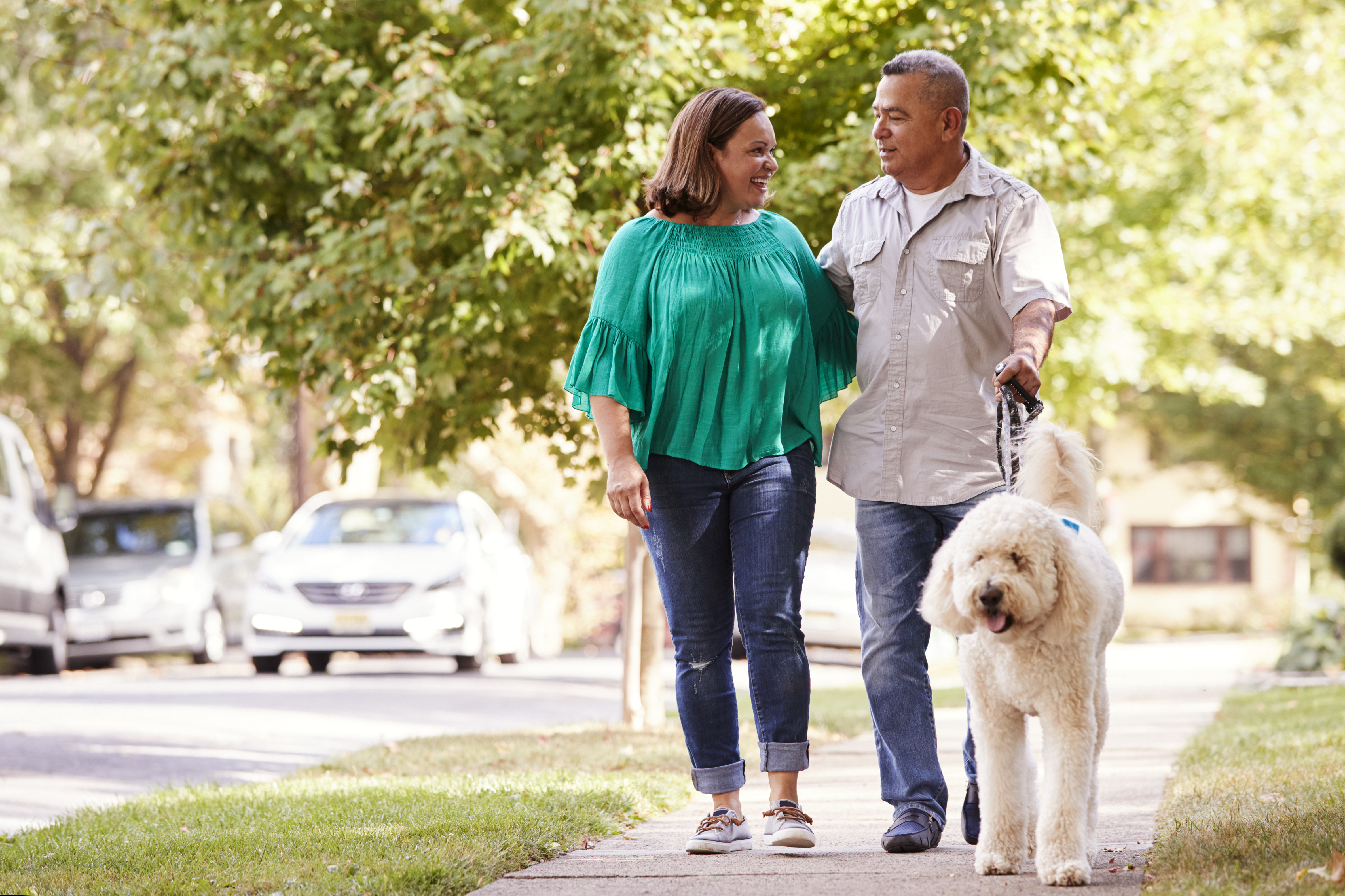March 10, 2023
What You Need to Know About At-Home Colon Cancer Testing

When found early, colorectal cancer can be treated with a very high success rate. But finding it early is key since this type of cancer doesn’t typically show symptoms until it’s grown rather large and possibly already grown into the colon wall or lymph nodes and nearby tissue. Thankfully there are tests that accurately screen for colon and rectal cancers.
A colonoscopy is the most well-known type of screening, and it continues to be the most accurate way to screen for colorectal cancer. However, for those considered at average risk for developing this type of cancer, there is an option for taking a test at home.
At-home colon cancer tests can offer a convenience that colonoscopies just can’t. For most of them, there is little or no preparation needed. And you can take the at-home tests when it’s convenient for you rather than scheduling time for a colonoscopy that requires a day of preparation beforehand.
How to Determine Your Risk Level for Colorectal Cancer
Colorectal cancer used to require screening starting at age 50. But because more young people in their 30s and 40s are being diagnosed, the American Cancer Society now recommends colorectal cancer screening start at age 45 for people with an average risk of colorectal cancer and no symptoms.

Certain lifestyle choices, pre-existing conditions, and genetic syndromes, as well as a family or personal history of colorectal cancer, put individuals into the high-risk category, which means they may need to be screened earlier and/or more often.

At-Home Colon Cancer Tests: What Are the Options?
Screening that checks for the presence of blood in a stool sample is called a fecal occult blood test, or FOBT, for short. Occult blood isn’t visual to the naked eye, which is why a stool sample must be submitted to a lab where it can be inspected thoroughly for the microscopic presence of blood. This method of screening helps doctors diagnose benign (noncancerous) conditions and detect colorectal cancer if it is present.
The US Food and Drug Administration (FDA) has approved a few different stool tests that can be used for colon cancer screening. The collection methods referenced above are typical but may vary according to test kit manufacturers. To ensure accuracy, follow the directions carefully and use kits before they expire.
The video below compares at-home colorectal cancer test kits to a colonoscopy. Watch to learn more.
Fecal Immunochemical Test (FIT or iFOBT)
This is a widely-used test because of its affordability and increased sensitivity in detecting blood in the stool. The testing process involves the use of antibodies that bind to hemoglobin protein, which shows whether blood is present in the stool. Collecting a stool sample is fairly simple: a fecal sample is scraped with a small probe, inserted into a sampling container, and returned to the lab. Changes in diet are not required before testing for the FIT; however, certain medications may affect test results. Be sure to ask your healthcare provider if there is anything you should avoid or modify before testing.
Stool DNA Test (FIT-DNA)
The FIT-DNA is a combo test that detects blood in the stool and screens DNA cells that are shed from the colon and the rectum during a bowel movement. Cologuard is one of these types of tests. Upon receiving the sample, the lab can extract DNA from the stool to identify whether or not mutated or abnormal genes are present. This test collects a full stool sample and does not require dietary changes.
Guaiac FOBT (gFOBT)
The gFOBT is another test that looks for blood in the stool — specifically, the presence of heme, a component of hemoglobin. In this test, applicator sticks are used to collect a few samples from different bowel movements. The samples are smeared onto a paper card coated with guaiac and then sent back off for testing. At the lab, hydrogen peroxide will be added to the card. If the card turns blue, it means that blood is present.
Due to the sensitivity of this test, your doctor may ask you to stop eating foods that contain heme in preparation for testing to avoid a false positive. This might include refraining from red meat, poultry, seafood, turnips, horseradish, and citrus fruits and juices. Inaccurate results can also be caused by certain nonsteroidal anti-inflammatory drugs (NSAIDs) and supplements, such as Vitamin C and iron. Ask your doctor if there are any adjustments you need to make before taking the test.
Regardless of which test is chosen, women should keep in mind that menstruation can cause a false positive. Therefore, it is best to avoid administering the test during a period cycle.
What the Results Mean For You
It’s important to understand that blood in your stool does not necessarily mean you have cancer. Other conditions, such as IBD, ulcerative colitis, hemorrhoids, polyps, or anal fissures, could contribute to gastrointestinal bleeding. If your testing detects blood, your doctor will recommend additional testing to determine the cause of your positive test result.
The FIT-DNA test is also looking for any genetic mutations that are associated with colorectal cancer. If these are found, your doctor will likely recommend you switch to a colonoscopy for all future screening.
If you receive a negative test, no blood was found in the sample, and no genetic mutations were noted, if the test you took included the DNA review.
For some individuals, test results might come back as inconclusive. This means that there might have been an issue with your specimen. If this happens to you, it’s likely that your primary care physician will request repeat testing or move on to a colonoscopy.
Your doctor will be able to discuss the risks of receiving either a false-positive or false-negative result. Despite the risk, the National Cancer Institute points to probable benefits, “Studies show that some screening tests for colorectal cancer help find cancer at an early stage and may decrease the number of deaths from the disease.”
When to Have a Colonoscopy Instead of an At-Home Stool Test?
A colonoscopy is the best place to start for those with a family history of polyps or colorectal cancer or if your doctor has told you that your lifestyle has put you at a higher risk for colorectal cancer. The reason for this is that a colonoscopy can not only detect cancer but also allows the doctor to remove anything that’s concerning. Samples of the tissue that’s removed can then be tested for cancer or other conditions.
Even if you’re at average risk for colorectal cancer, it’s best to have a doctor look inside the colon periodically. Your doctor will discuss with you whether they think you can use a few at-home tests before a colonoscopy is recommended. The results of the at-home test will also impact when they feel a colonoscopy is needed.
What Happens During a Colonoscopy?
You will be sedated for this outpatient procedure, where a thin tube with a lens is inserted to examine the entire colon. Polyps or other tissues are also often removed for biopsy. Before a colonoscopy, your doctor will provide you with instructions that will help you clear out your colon as much as possible prior to testing. Although the colonoscopy prep can take a few days, the test itself usually doesn’t take more than an hour.
Stay One Step Ahead of Colorectal Cancer With Annual Screenings
The cancer specialists at Cancer Care Centers of Brevard recommend annual colon and rectal cancer screening by the time you’re 45 years old. While there is some risk of receiving a false positive or having a complication in some of the screenings, the benefits of screening far outweigh the risks. We encourage you to consider all your possible risk factors for colon cancer. Early detection and early treatment of cancer, if found, can yield improved outcomes.
If abnormal test results determine that colon cancer was detected, the cancer doctors at Cancer Care Centers of Brevard are here to provide you with a personalized colorectal cancer treatment plan or a second opinion. We have convenient locations in the Brevard County area, including Palm Bay, Melbourne, Merritt Island, and Rockledge, FL.
Categories: Colorectal Cancer